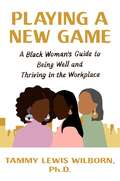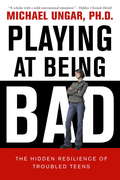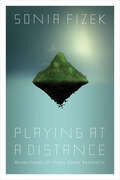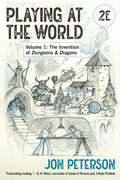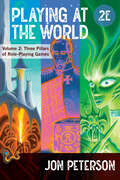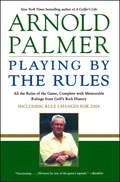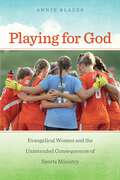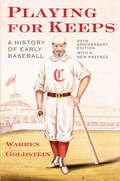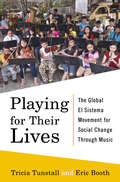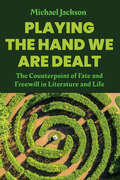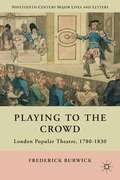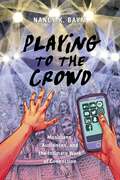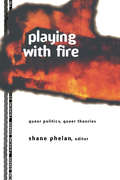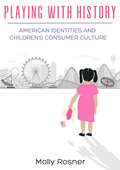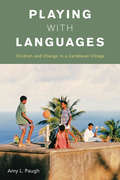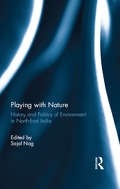- Table View
- List View
Playing a New Game: A Black Woman's Guide to Being Well and Thriving in the Workplace
by Tammy Lewis Wilborn, PhDDrawing on first-hand clinical insight and scientific research, Dr. Wilborn offers much-needed advice on how women of color can be high-performing and successful professionally, without sacrificing their physical, mental, and emotional wellness. Black and brown women have been making profound strides in leadership and professional achievement, despite facing the added hurdles of both sexism and racism in the workplace. But so often, excelling at work comes at the expense of their wellness: the chronic stressors and demands on Black women can result in negative physical health outcomes such as sleep disturbance, hypertension, and diabetes, and negative mental health outcomes including anxiety and depression. We cannot talk about career advancement for Black and brown women without talking about strategies that promote their total wellbeing.Playing a New Game offers women a new way forward, in which ambition and wellness can not only coexist, but bolster each other. With insights from her 20 years of professional counseling experience and extensive research, mental health expert Dr. Tammy Wilborn expands the dialogue on BIPOC women&’s experiences of race and gender stereotypes at work, exploring them as a wellness issue. Through her evidence-based best practices that promote self-care and self-empowerment as necessary tools for professional success, Black and brown women can flip the script by prioritizing their wellness even as they advance professionally.
Playing at Being Bad: The Hidden Resilience of Troubled Teens
by Michael Ungar"Our most troubled youth are far more resilient and healthy than we are ready to admit. If we take the time to listen very closely to our children speak about their experiences beyond our front doors, we hear an entirely different story about their lives than the one we adults tell. Unlike many other books about difficult kids that reflect the wisdom of adults, this one explores the truth of adolescence. It builds on recent explorations of youth such as Mary Pipher's Reviving Ophelia, Judith Rich Harris' The Nurture Assumption, and William Pollack's Real Boys. It examines emerging trends in psychology, as well as recent innovations in work with our most unhealthy young people. Playing at Being Bad offers particular insight for parents, teachers, and caregivers of troubled youth just beginning, or already stuck in, patterns of delinquency, drug or alcohol addiction, sexual promiscuity, violence, suicide, depression, and truancy. This book tells the story of the teens Ungar worked with for more than fifteen years, taking a close look at the crises kids face, while exploring the important role that adults can play in keeping dangerous and delinquent youth from drifting further into trouble.
Playing at War: Identity and Memory in Civil War Video Games (American Wars and Popular Culture)
by Matthew E. Stanley Nick Sacco Matthew Christopher Hulbert Christian McWhirter Daniel Farrell Dr James Frusetta Dr Blake Hill Dr Jonathan S. Jones John R. Legg Dr Holly Pinheiro Jacopo Della Quercia Dr David Silkenat Dr Kathleen Logothetis Thompson Dr Charles R. Welsko Dr Katherine L. Brackett Dr Stephen Edwards Aaron M. Phillips Dr Erzsebet FazekasPlaying at War offers an innovative focus on Civil War video games as significant sites of memory creation, distortion, and evolution in popular culture. With fifteen essays by historians, the collection analyzes the emergence and popularity of video games that topically engage the period surrounding the American Civil War, from the earliest console games developed in the 1980s through the web-based games of the twenty-first century, including popular titles such as Red Dead Redemption 2 and War of Rights. Alongside discussions of technological capabilities and advances, as well as their impact on gameplay and content, the essays consider how these games engage with historical scholarship on the Civil War era, the degree to which video games reflect and contribute to popular understandings of the period, and how those dynamics reveal shifting conceptions of martial identity and historical memory within U.S. popular culture. Video games offer productive sites for extending the analysis of Civil War memory into the post–Confederates in the Attic era, including the political and cultural moments of Obama and Trump, where overt expressions of Lost Cause memory were challenged and removed from schools and public spaces, then embraced by new manifestations of white supremacist organizations. Edited by Patrick A. Lewis and James Hill Welborn III, Playing at War traces the drift of Civil War memory into digital spaces and gaming cultures, encouraging historians to engage more extensively with video games as important cultural media for examining how contemporary Americans interact with the nation’s past.
Playing at a Distance: Borderlands of Video Game Aesthetic
by Sonia FizekAn essential exploration of video game aesthetic that decenters the human player and challenges what it means to play.Do we play video games or do video games play us? Is nonhuman play a mere paradox or the future of gaming? And what do video games have to do with quantum theory? In Playing at a Distance, Sonia Fizek engages with these and many more daunting questions, forging new ways to think and talk about games and play that decenter the human player and explore a variety of play formats and practices that require surprisingly little human action. Idling in clicker games, wandering in walking simulators, automating gameplay with bots, or simply watching games rather than playing them—Fizek shows how these seemingly marginal cases are central to understanding how we play in the digital age. Introducing the concept of distance, Fizek reorients our view of computer-mediated play. To &“play at a distance,&” she says, is to delegate the immediate action to the machine and to become participants in an algorithmic spectacle. Distance as a media aesthetic framework enables the reader to come to terms with the ambiguity and aesthetic diversity of play. Drawing on concepts from philosophy, media theory, and posthumanism, as well as cultural and film studies, Playing at a Distance invites a wider understanding of what digital games and gaming are in all their diverse experiences and forms. In challenging the common perception of video games as inherently interactive, the book contributes to our understanding of the computer&’s influence on practices of play—and prods us to think more broadly about what it means to play.
Playing at the World, 2E, Volume 1: The Invention of Dungeons & Dragons (Game Histories)
by Jon PetersonThe first volume of two in a new, updated edition of the 2012 book Playing at the World, which charts the vast and complex history of role-playing games.This new edition of Playing at the World is the first of two volumes that update the 720-page original tome of the same name from 2012. This first volume is The Invention of Dungeons & Dragons, which explores the publication of that iconic game. (The second volume is The Three Pillars of Role-Playing Games, a deeper dive into the history of the setting, system, and character of D & D.) In this first volume, Jon Peterson distills the story of how the wargaming clubs and fanzines circulating around the upper Midwest in the 1970s culminated in Gary Gygax and Dave Arneson’s seminal role-playing game, D & D. It augments the research of the original editions with new insights into the crucial period in 1972–3 when D & D began to take shape.Drawing from primary sources ranging from eighteenth-century strategists to modern hobbyists, Playing at the World explores the origins of wargames and roleplaying through the history of conflict simulations and the eccentric characters who drove the creation of a signature cultural innovation in the late twentieth century. Filled with unparalleled archival research (from obscure fanzines to letters, drafts, and other ephemera), this new edition of Playing at the World is the ultimate geek’s guide to the original RPG. As such, it is an indispensable resource for academics and game fans exploring the origins of the hobby.
Playing at the World, 2E, Volume 2: Three Pillars of Role-Playing Games (Game Histories)
by Jon PetersonThe second volume of two in a new, updated edition of the 2012 book Playing at the World, which charts the vast and complex history of role-playing games.This new edition of Playing at the World is the second of two volumes that update the 720-page original tome of the same name from 2012. This second volume is The Three Pillars of Role-Playing Games, a deep dive into the history of the setting, system, and characters of Dungeons & Dragons—the three pillars indicated by the volume&’s title. (The first volume of the new edition is The Invention of Dungeons & Dragons, which explores the publication and reception of that iconic game.)In this second volume, Jon Peterson covers the medieval fantasy setting—the first pillar—and addresses why the first role-playing game evolved around fantasy and medieval settings as opposed to some other historical setting. In the second pillar, the author explores how the rules of wargames, from their roots in chess variants from eighteenth-century Germany, developed into those of role-playing games. Finally, the third pillar focuses on character, perhaps the most elusive of the three pillars, and investigates how precedents governed the introduction of characters to games more so than the original D&D rule books.Filled with unparalleled archival research (from obscure fanzines to letters, drafts, and other ephemera), this new edition of Playing at the World is the ultimate geek&’s guide to the original RPG. As such, it is an indispensable resource for academics and game fans exploring the origins of the hobby.
Playing by the Rules: All the Rules of the Game, Complete with Memorable Rulings From Golf's Rich History
by Steve Eubanks Arnold PalmerIt was a moment seen by millions on television. During play at the 1999 Phoenix Open, Tiger Woods had a "loose impediment? removed to play his shot -- an everyday occurrence under golf's rules. But that impediment was not a leaf or twig, it was a 350-pound boulder that took six people to move! The gallery and television audience buzzed with disbelief. How could this be legal under the rules?Indeed it could, says golf legend Arnold Palmer, who throughout his distinguished career has taken part in a sizable share of rules controversies. Despite the fact that golf has fewer rules than such sports as baseball or football or rugby, it is a contest of honor, and all players, be they tour professionals or casual weekend hackers, respect the rules. But, as Palmer points out, sometimes the rules are a little confusing -- and from time to time, even the pros are puzzled.When exactly is a ball considered "lost?? How is "slow play? defined? And when is a "drop? allowed? Palmer helps makes sense of it all with simple-to-understand language and hundreds of "infamous? pictures of some of the more controversial rulings -- affording readers a visual recall of memorable moments involving Greg Norman, Lee Janzen, Mark O'Meara, John Daly, even Palmer himself.If you're one of the millions who taketo the links every year, need a clear explanation of all the rules of the game you love, and more important, don't want to be speechless when an argument over the "coefficient of restitution? pops up, then Playing By The Rules will be an invaluable guide you'll refer to time and again.
Playing for God: Evangelical Women and the Unintended Consequences of Sports Ministry (North American Religions)
by Annie BlazerWhen sports ministry first emerged in the 1950s and 1960s, its founders imagined male celebrity athletes as powerful salespeople who could deliver a message of Christian strength: “If athletes can endorse shaving cream, razor blades, and cigarettes, surely they can endorse the Lord, too,” reasoned Fellowship of Christian Athletes founder Don McClanen. But combining evangelicalism and sport did much more than serve as an advertisement for religion: it gave athletes the opportunity to think about the embodied experiences of sport as a way to experience intimate connection with the divine. As sports ministry developed, it focused on individual religious experiences and downplayed celebrity sales power, opening the door for female Christian athletes to join and eventually dominate sports ministry. Today, women are the majority of participants in sports ministry in the United States. In Playing for God, Annie Blazer offers an exploration of the history and religious lives of Christian athletes, showing that evangelical engagement with popular culture can carry unintended consequences. When sport became an avenue for embodied worship, it forced a reckoning with evangelical teachings about the body. Female Christian athletes increasingly turned to their own bodies to understand their religious identity, and in so doing, came to question evangelical mainstays on gender and sexuality. What was once a male-dominated masculinist project of sports engagement became a female-dominated movement that challenged evangelical ideas on femininity, marriage hierarchy, and the sinfulness of homosexuality. Though evangelicalism has not changed sporting culture, for those involved in sports ministry, sport has changed evangelicalism.
Playing for Keeps: A History of Early Baseball
by Warren GoldsteinIn the late 1850s, organized baseball was a club-based fraternal sport thriving in the cultures of respectable artisans, clerks and shopkeepers, and middle-class sportsmen. Two decades later it had become an entertainment business run by owners and managers, depending on gate receipts and the increasingly disciplined labor of skilled player-employees. Playing for Keeps is an insightful, in-depth account of the game that became America's premier spectator sport for nearly a century.Reconstructing the culture and experience of early baseball through a careful reading of the sporting press, baseball guides, and the correspondence of the player-manager Harry Wright, Warren Goldstein discovers the origins of many modern controversies during the game's earliest decades.The 20th Anniversary Edition of Goldstein's classic includes information about the changes that have occurred in the history of the sport since the 1980s and an account of his experience as a scholarly consultant during the production of Ken Burns's Baseball.
Playing for Their Lives: The Global El Sistema Movement for Social Change Through Music
by Tricia Tunstall Eric BoothAn eye-opening view of the unprecedented global spread of El Sistema--intensive music education that disrupts the cycles of poverty. In some of the bleakest corners of the world, an unprecedented movement is taking root. From the favelas of Brazil to the Maori villages in New Zealand, from occupied Palestine to South Central Los Angeles, musicians with strong social consciences are founding intensive orchestra programs for children in need. In this captivating and inspiring account, authors Tricia Tunstall and Eric Booth tell the remarkable story of the international El Sistema movement. A program that started over four decades ago with a handful of music students in a parking garage in Caracas, El Sistema has evolved into one of classical music's most vibrant new expressions and one of the world's most promising social initiatives. Now with more than 700,000 students in Venezuela, El Sistema's central message--that music can be a powerful tool for social change--has burst borders to grow in 64 countries (and that number increases steadily) across the globe. To discover what makes this movement successful across the radically different cultures that have embraced it, the authors traveled to 25 countries, where they discovered programs thriving even in communities ravaged by poverty, violence, or political unrest. At the heart of each program is a deep commitment to inclusivity. There are no auditions or entry costs, so El Sistema's doors are open to any child who wants to learn music--or simply needs a place to belong. While intensive music-making may seem an unlikely solution to intractable poverty, this book bears witness to a program that is producing tangible changes in the lives of children and their communities. The authors conclude with a compelling and practicable call to action, highlighting civic and corporate collaborations that have proven successful in communities around the world.
Playing on the Edge: Sadomasochism, Risk, and Intimacy
by Staci NewmahrRepresentations of consensual sadomasochism range from the dark, seedy undergrounds of crime thrillers to the fetishized pornographic images of sitcoms and erotica. In this pathbreaking book, ethnographer Staci Newmahr delves into the social space of a public, pansexual SM community to understand sadomasochism from the inside out. Based on four years of in-depth and immersive participant observation, she juxtaposes her experiences in the field with the life stories of community members, providing a richly detailed portrait of SM as a social space in which experiences of "violence" intersect with experiences of the erotic. She shows that SM is a recreational and deeply gendered risk-taking endeavor, through which participants negotiate boundaries between chaos and order. Playing on the Edge challenges our assumptions about sadomasochism, sexuality, eroticism, and emotional experience, exploring what we mean by intimacy, and how, exactly, we achieve it.
Playing the Hand We Are Dealt: The Counterpoint of Fate and Freewill in Literature and Life
by Michael JacksonThe relationship between literature and life can be construed as a counterpoint of fate and freewill. Rather than equating fate to the ‘hand we are dealt’ which is reducible to the social or familial environments into which we are born, this book explores the idea of fate through the books that shape our lives and under whose influence we write. Writing in this sense is seen as beyond its utility of making meaning. It is a way of recovering agency in the face of overwhelming experiences. In juxtaposing factuality and fiction, the author makes a case for a radically empirical approach to human experience.
Playing the Identity Card: Surveillance, Security and Identification in Global Perspective
by David Lyon Colin J. BennettNational identity cards are in the news. While paper ID documents have been used in some countries for a long time, today's rapid growth features high-tech IDs with built-in biometrics and RFID chips. Both long-term trends towards e-Government and the more recent responses to 9/11 have prompted the quest for more stable identity systems. Commercial pressures mix with security rationales to catalyze ID development, aimed at accuracy, efficiency and speed. New ID systems also depend on computerized national registries. Many questions are raised about new IDs but they are often limited by focusing on the cards themselves or on "privacy." Playing the Identity Card shows not only the benefits of how the state can "see" citizens better using these instruments but also the challenges this raises for civil liberties and human rights. ID cards are part of a broader trend towards intensified surveillance and as such are understood very differently according to the history and cultures of the countries concerned.
Playing the Marginality Game: Identity Politics in West Africa (Integration and Conflict Studies #19)
by Anita SchrovenIn Guinea, situated in the background of central government struggles, rural elites use identity politics, through history and contemporary political reforms to maintain their privileges and perpetuate a generation-old local social contract that bridges ethnic and religious divides. Simultaneously, administrative reform and national unrest lead to the creative re-combination of sources of authority and practices of legitimate rule. Past periods of decolonization, socialism and authoritarian regime are reflected in contemporary struggles to make sense of participatory democracy and the future of the embattled Guinean national state.
Playing the Supporting Role: Strip Club Managers and Other Third Parties
by Tuulia LawStrippers may be the main attraction of strip clubs, but their work is bolstered by people who are rarely meaningfully considered: those who organize, supervise, manage, or coordinate the labour of erotic dancers, including managers, bouncers, and disc jockeys. Playing the Supporting Role contends it is essential to explore the managerial layer in order to have a comprehensive understanding of the power relations and working conditions in the erotic dance sector – and, consequently, distinguish banal or beneficial from unfair or exploitative sex-industry labour practices. Focusing primarily on third parties in the erotic dance sector, this book examines who these individuals are; how they manage clients, workers, security, and stigma; the services and resources they provide; and, in turn, strippers’ experiences and perceptions of these practices. Through qualitative interview data with third parties and strippers from two Ontario cities, Playing the Supporting Role ultimately advances an understanding of third-party work as gendered, classed, and racialized occupational performance in a stigmatized labour sector that is simultaneously over- and under-regulated.
Playing to the Crowd
by Frederick BurwickThe firststudy ofthe productions of the minor theatres, how theywere adapted toappealto the local patrons and the audienceswho worked and lived inthese communities. "
Playing to the Crowd: Musicians, Audiences, and the Intimate Work of Connection (Postmillennial Pop #14)
by Nancy K. BaymExplains what happened to music—for both artists and fans—when music went online. Playing to the Crowd explores and explains how the rise of digital communication platforms has transformed artist-fan relationships into something closer to friendship or family. Through in-depth interviews with musicians such as Billy Bragg and Richie Hawtin, as well as members of the Cure, UB40, and Throwing Muses, Baym reveals how new media has facilitated these connections through the active, and often required, participation of the artists and their devoted, digital fan base.Before the rise of social sharing and user-generated content, fans were mostly seen as an undifferentiated and unidentifiable mass, often mediated through record labels and the press. However, in today’s networked era, musicians and fans have built more active relationships through social media, fan sites, and artist sites, giving fans a new sense of intimacy and offering artists unparalleled information about their audiences. However, this comes at a price. For audiences, meeting their heroes can kill the mystique. And for artists, maintaining active relationships with so many people can be both personally and financially draining, as well as extremely labor intensive.Drawing on her own rich history as an active and deeply connected music fan, Baym offers an entirely new approach to media culture, arguing that the work musicians put in to create and maintain these intimate relationships reflect the demands of the gig economy, one which requires resources and strategies that we must all come to recognize and appreciate.
Playing with Feelings: Video Games and Affect
by Aubrey AnableHow gaming intersects with systems like history, bodies, and code Why do we so compulsively play video games? Might it have something to do with how gaming affects our emotions? In Playing with Feelings, scholar Aubrey Anable applies affect theory to game studies, arguing that video games let us &“rehearse&” feelings, states, and emotions that give new tones and textures to our everyday lives and interactions with digital devices. Rather than thinking about video games as an escape from reality, Anable demonstrates how video games—their narratives, aesthetics, and histories—have been intimately tied to our emotional landscape since the emergence of digital computers.Looking at a wide variety of video games—including mobile games, indie games, art games, and games that have been traditionally neglected by academia—Anable expands our understanding of the ways in which these games and game studies can participate in feminist and queer interventions in digital media culture. She gives a new account of the touchscreen and intimacy with our mobile devices, asking what it means to touch and be touched by a game. She also examines how games played casually throughout the day create meaningful interludes that give us new ways of relating to work in our lives. And Anable reflects on how games allow us to feel differently about what it means to fail.Playing with Feelings offers provocative arguments for why video games should be seen as the most significant art form of the twenty-first century and gives the humanities passionate, incisive, and daring arguments for why games matter.
Playing with Fire
by Chicago Tribune StaffThe average American baby is born with 10 fingers, 10 toes, and the highest recorded levels of flame retardants among infants in the world. How could it possibly be in the US that children are already contaminated at birth with such disturbingly high levels of toxic chemicals? The truth lies in the greed and deception of two powerful industries-Big Tobacco and chemical manufacturers.In a groundbreaking piece of investigative journalism by the Chicago Tribune, Playing with Fire exposes the realities about the ineffectiveness and potential health risks caused by the flame retardants that are pervasive in American homes. Big Tobacco and large chemical companies used fear, exaggerated scientific claims, and shady deal-making to serve their own interests at the expense of consumer safety.Playing with Fire is an extremely significant, revelatory piece of watchdog journalism that is a must-read for anyone with small children and for citizens who demand responsibility of big businesses and their governments. The investigation, launched in May 2012, prompted two US Senate hearings, and the US Environmental Protection Agency announced it would launch an investigation of flame retardants. Also, California's governor said the state would scrap the rule responsible for flame retardants' presence in furniture.
Playing with Fire: Feminist Thought and Activism through Seven Lives in India
by Sangtin WritersSeven voices contribute to this rare glimpse of the work being done on the front lines of the fight for social change in India. Playing with Fire is written in the collective voice of women employed by a large NGO as activists in their communities and is based on diaries, interviews, and conversations among them. Together their personal stories reveal larger themes and questions of sexism, casteism, and communalism, and a startling picture emerges of how NGOs both nourish and stifle local struggles for solidarity. The Hindi edition of the book, Sangtin Yatra, published in 2004, created controversy that resulted in backlash against the authors by their employer. The publication also drew support for the women and instigated a public conversation about the issues exposed in the book. Here, Richa Nagar addresses the dispute in the context of the politics of NGOs and feminist theory, articulating how development ideology employed by aid organizations serves to reinforce the domination of those it claims to help. The Sangtin Writers, Anupamlata, Ramsheela, Reshma Ansari, Richa Singh, Shashibala, Shashi Vaish, Surbala, and Vibha Bajpayee, are grassroots activists and members of a small organization called Sangtin in Uttar Pradesh, India. Richa Nagar teaches women's studies at the University of Minnesota.
Playing with Fire: Queer Politics, Queer Theories (Thinking Gender)
by Shane PhelanThe last five years have witnessed the birth of a vibrant new group of young scholars who are writing about queer law, politics, and policy--topics which are no longer treated as of interest only to lesbians and gay men, but which now garner the attention of political theorists of all stripes. Playing With Fire--the first scholarly collection on queer politics by US political theorists--opens the intersection of lesbian and gay studies and political theory to a wide audience. It covers a wide range of issues, including: the theory of queer identities; the contrasts among ethnic, racial, and sexual identities; the debate between liberals and communitarians; the right to privacy; and the meaning of equal citizenship.
Playing with Friends: Comparing Past and Present (Comparing Past and Present)
by Rebecca RissmanRead Playing with Friends to learn how games, hobbies, and sports have changed over time! Photographs and clear text compare and contrast modern and historical amusements in a child-friendly format, making this a great tool for discussing how life has changed over the years.
Playing with History: American Identities and Children’s Consumer Culture
by Molly RosnerSince the advent of the American toy industry, children’s cultural products have attempted to teach and sell ideas of American identity. By examining cultural products geared towards teaching children American history, Playing With History highlights the changes and constancies in depictions of the American story and ideals of citizenship over the last one hundred years. This book examines political and ideological messages sold to children throughout the twentieth century, tracing the messages conveyed by racist toy banks, early governmental interventions meant to protect the toy industry, influences and pressures surrounding Cold War stories of the western frontier, the fractures visible in the American story at a mid-century history themed amusement park. The study culminates in a look at the successes and limitations of the American Girl Company empire.
Playing with Languages
by Amy L. PaughOver several generations villagers of Dominica have been shifting from Patwa, an Afro-French creole, to English, the official language. Despite government efforts at Patwa revitalization and cultural heritage tourism, rural caregivers and teachers prohibit children from speaking Patwa in their presence. Drawing on detailed ethnographic fieldwork and analysis of video-recorded social interaction in naturalistic home, school, village and urban settings, the study explores this paradox and examines the role of children and their social worlds. It offers much-needed insights into the study of language socialization, language shift and Caribbean children's agency and social lives, contributing to the burgeoning interdisciplinary study of children's cultures. Further, it demonstrates the critical role played by children in the transmission and transformation of linguistic practices, which ultimately may determine the fate of a language.
Playing with Nature: History and Politics of Environment in North-East India
by Sajal NagNorth East India is called nature’s gift to India. It is mountainous, thickly forested, nourished by massive rainfall, has massive rivers, has a diverse wildlife, inhabited a number of forest dwellers called tribes who cherished environmentalist ethos. The region has been experiencing environmental depletion which was a result of colonial policies, exploitation of its ecological and mineral resources, large scale trans-border immigration and settlement of people, establishment of the plantation industry through deforestation and the dependence of the dairy industry on grazing and other factors. This books depicts the precariousness of the environmental situation and traces the history and politics of such degeneration with a view to raise the consciousness of the people of the region towards their environment and save it from further aggravation.
